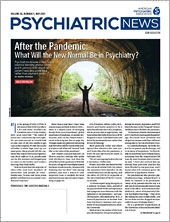Patients with atrial fibrillation who take anticoagulants may have an increased risk of dementia compared with those who do not take anticoagulants, a study in the American Journal of Geriatric Psychiatry has found.
Laure Rouch, Pharm.D., Ph.D., a visiting scholar in the Department of Psychiatry at the University of California, San Francisco, and colleagues examined data from 407,871 veterans aged 55 years or older who received care at the Veterans Health Administration between August 2003 and September 2015 to compare dementia risk in veterans who had atrial fibrillation with those who did not have atrial fibrillation. They followed the veterans for a median of 3.4 years until dementia, death, or their most recent clinical visit, whichever came first. “No one has looked at atrial fibrillation and dementia in veterans, although it is a high-risk population due to elevated general and military risk factors,” Rouch told Psychiatric News.
Patients with atrial fibrillation were 14% more likely to develop dementia than those without atrial fibrillation. Compared with patients who did not have atrial fibrillation, those who had atrial fibrillation were more likely to have hypertension, diabetes, obesity, myocardial infarction, congestive heart failure, transient ischemic attacks or stroke, and valvular heart disease. Among those conditions, congestive heart failure, valvular heart disease, transient ischemic attacks or stroke, and myocardial infarction were found to partially mediate dementia risk.
“Previous studies reported this association in younger people. Our findings add that this is also true in older adults,” said Rouch. “Our results are pretty convincing in suggesting the importance of adequate management of cardiovascular disease and stroke in patients with atrial fibrillation, as they partially explained dementia risk.”
Roughly 44% of those with atrial fibrillation were prescribed anticoagulants, compared with roughly 2% without atrial fibrillation. Those who took anticoagulants had a 44% higher risk of dementia than those who did not take anticoagulants.
“One possible explanation [for this increased risk] is that anticoagulation may lead to cerebral microbleeds that are well-known to increase dementia risk,” Rouch explained. “An alternative hypothesis is that anticoagulation therapy was indicative of greater atrial fibrillation severity.”
“I think this study reminds us, once again, that heart health is key to brain health,” Rouch said. “Most people think of dementia as one condition and vascular disease as a separate one when there is actually tremendous overlap and interplay between the two. We hope this research will raise awareness among clinicians about the importance of monitoring cognitive function in the management of patients with atrial fibrillation, irrespective of anticoagulation status.”
This study was supported by the National Institute on Aging. ■
“Atrial Fibrillation Is Associated with Greater Risk of Dementia in Older Veterans” is posted
here.


